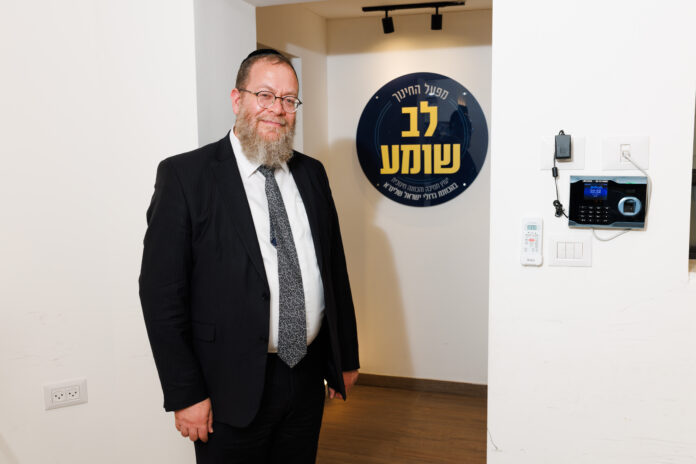While there are many kiruv organizations with outreach programs designed for secular Jews, kids who left the fold or are at risk of leaving, the Lev Shomea organization of Eretz Yisrael, headed by Rabbi Eliav Miller, is a standout with its inward focus. Its aim is to help even the brightest and best yeshivah bachur or seminary girl deal with his or her psychological and spiritual challenges. With highly trained mechanchim and guidance counselors manning the telephone lines, the calls come pouring in.
In the aftermath of the terrible massacre and atrocities that transpired this past Simchas Torah, the Lev Shomea operators are busier than ever. Hundreds of mental health professionals have recently been hired to help callers unburden themselves and to provide the help that they need.
In order to glean an understanding of what our youth are experiencing and what is being done to ease their anguish, I spoke with Rav Miller last week.
The current situation in Eretz Yisrael and the spread of anti-Semitism throughout the world is challenging even for the adults in our community, let alone bachurim and girls. I’m sure that this has led to more nisyonos and problems that you and your staff now have to deal with.
Absolutely. We are living in very precarious times. For those of us in Eretz Yisrael, we are still in the middle of Rosh Hashanah and Yom Kippur. There’s a fear and an awareness of the Yom Hadin that continues to accompany us. We all feel very connected to Hakadosh Baruch Hu in our tefillos and in our thoughts.
At the same time, the Gemara tells us the mashal regarding Simchas Torah, about the king who tells his servants to make a big seudah, but then afterwards instructs his close friend to make a small seudah so he can be alone with him. Similarly, we also feel that Hakadosh Baruch Hu is especially close to us ever since Simchas Torah, and we are still alone with Him at the table.
Even so, we are experiencing difficulties that someone who is in chutz laaretz might not fully appreciate. It’s true that the entire Jewish world has been affected by what happened, but many children here are feeling genuine fear and anxiety. I’m not referring to those who witnessed terrible things or heard gunshots and explosions. Even a child who lives in Yerushalayim, which is far away from what is happening, looks around and sees Arab homes. There aren’t any fences separating us from them, and there’s no difference between the Arabs who live in Gaza and the ones who live near my house as far as the plans they have in mind for us. I obviously don’t tell that to my children, but kids have their own way of understanding what’s going on. They ask their father, “How can we lock our safe room in a way that it can’t be opened from the outside?”
At one point, the Home Front Command announced that people should stock up on food and water and prepare flashlights and batteries in the event our infrastructure is hit by Hamas, Hezbollah or Iran, and there are occasional blackouts. Every building has either a shelter or a safe room. In apartment buildings with shelters, they’re usually used as storage space for the residents, but we have been ordered not to pack away our sukkahs to keep the shelters empty. The children see this and realize how vulnerable we are.
There are children who are calmer by nature or who care more about what’s for lunch than what might happen tomorrow with Iran, and they may even find the action interesting and are hoping it means they’ll get some time off from school. They don’t really understand the danger. But there’s also a considerable percentage of children and teenagers who are developing anxiety. Their parents may be dealing with the same thing, and they don’t know what to do about it themselves or how to talk to their children about it. When a child sees that his father is fearful, he himself feels even more insecure and becomes even more anxious and afraid.
This is something that my staff had to start addressing right away. We had to help parents, rabbanim in yeshivos and rebbeim in cheder by providing them with talking points, and we also had to give answers to the bachurim themselves.
People were talking about the neis in Tifrach, when the terrorists didn’t enter the moshav and everyone was saved. It was a great miracle; there’s a big yeshivah there and not a single bachur was harmed. However, of the 1,500 bachurim who were there, at least 10% or even 20% experienced some sort of mental shakeup that someone needs to speak to them about, at the very least. Twenty percent is 300 bachurim. Someone has to listen to them and give them an opportunity to unload this burden they’re carrying. And it’s not just from having heard gunshots; it’s more existential, and I believe that the same applies to every yeshivah in Eretz Yisrael, not to mention the younger children in cheder and the girls in high school and seminary. The problem isn’t simple at all.
To read more, subscribe to Ami





















